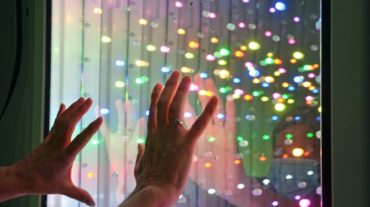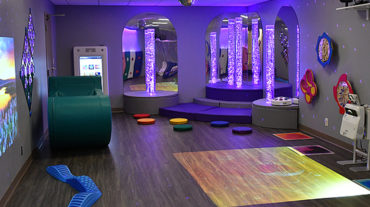Buckner Villas Retirement Services
"Quality of life" is a phrase you may hear a lot in discussions of residential care for the geriatric population. For those who work in long-term care settings, providing a good quality of life for their residents is a top priority. Buckner Villas, a senior living community in Austin, Texas and Extendicare Tecumseh in Tecumseh, Ontario are two different types of facilities in two quite different locations, but they have an important thing in common: at both facilities, Snoezelen® Multi-Sensory Environments are a vital part of ensuring that residents enjoy the best possible quality of life.*
While both Buckner Villas and Extendicare Tecumseh have Snoezelen Multi-Sensory Environments, each facility has a unique story behind its Snoezelen room. At Buckner Villas, interest in Snoezelen began with director of assisted living Ginger White. Buckner Retirement Services, Inc., a faith-based, not for profit organization with seven retirement communities in Texas, is in the process of completing an expansion project of Buckner Villas, complete with a new Certified Alzheimer's community called "The Harbor." As plans for this unit, which can accommodate up to forty residents, were being drawn up, White wanted to get an idea of what similar facilities were doing for residents with Alzheimer's. In January of 2009, she went to Dallas, TX, where she toured a facility that had what she describes as a "do-it-yourself" multi-sensory environment designed along the lines of a Snoezelen room. Intrigued by this idea, White then went to see an "official" Snoezelen room at the Christian Care facility in Mesquite, TX. After those experiences, White was decided: she felt that the new Buckner facility had to have a Snoezelen room, and accordingly approached the director at Buckner Villas with her idea. It quickly gained approval, and White submitted a proposal to Buckner's corporate office for retirement services in Dallas. Once the corporate office approved the proposal, White was able to contact Snoezelen consultant Cathie Hird of FlagHouse, Inc., eager to get Buckner Villas' Snoezelen project underway.
While both the Buckner Villas facility and its Snoezelen are still very new—The Harbor celebrated the opening of its Snoezelen room in early April 2010—the Extendicare Tecumseh facility and its resident program manager, Alina Sirbu, already have a significant history of Snoezelen experience. Sirbu, who came to this facility not long after its opening over six years ago, had prior training with Snoezelen from a previous position at a retirement home in Toronto. One of over 300 facilities owned by the Extendicare Corporation, the Tecumseh location is home to 128 residents, a growing number of whom are displaying signs of dementia, especially Alzheimer's. Sirbu, who had succeeded in opening a Snoezelen room at the retirement home where she had previously worked and where Snoezelen had been intended primarily for relaxation, had observed that residents with Alzheimer's responded particularly well to Snoezelen sessions. She quickly came to realize that "the room had amazing benefits," and this realization motivated her to approach her supervisor at Extendicare Tecumseh about the possibility of opening a Snoezelen room at the new facility.
"I've seen what the room can do," she says in explanation of her commitment to bring Snoezelen to Tecumseh. Her enthusiasm was very convincing, and her administrator at Extendicare Tecumseh, James Egan, agreed to let her go ahead with the project, allowing her to collaborate with FlagHouse representative Cathie Hird to design her "dream" room.
While Sirbu had plenty of previous training and hands-on experience using Snoezelen with geriatric patients by the time the room at Extendicare Tecumseh was complete, White felt that it was important to get some initial guidance in introducing Snoezelen therapy at Buckner Villas. With this in mind, she brought a second FlagHouse Snoezelen consultant, Carolyn Jackson, to The Harbor's newly installed room to train the facility's activity director, who is available seven days a week to supervise residents' Snoezelen sessions. Both White and Sirbu agree that it is very important to assess each resident's needs and reactions to different elements of the multi-sensory environment in order to maximize the effectiveness of Snoezelen. As White points out, "they all like something different," and what is calming to one person may be upsetting to another. Sirbu has developed a sophisticated system of observation and assessment, in which all Extendicare Tecumseh residents who use the Snoezelen room are pre-evaluated to determine initial needs and reactions, then re-assessed after nine months to determine how they are responding. In addition, staff members record a summary of each Snoezelen session for every resident, creating individual histories that allow Sirbu and her colleagues to tailor the experience to each patient.
Snoezelen MSEs are designed to both soothe and stimulate the participants' senses, based on each individual's needs. At Buckner Villas, White has already noted the remarkable power of the Snoezelen room to calm residents of The Harbor. This part of the Austin facility was specially designed to provide a relaxing atmosphere for its residents, and staff and visitors have already noticed positive changes in residents who have had the opportunity to use the Snoezelen room. White says that everyone who experiences it is amazed at how calming the room can be. One resident in particular, a woman who exhibited anxiety through constant repetitive vocalization, was finally able to relax in one of the Snoezelen room's VibroMusic recliners, to the point that she was able to speak to a staff member about her family. Other residents are noticeably soothed by watching the cyclical movements of small, brightly colored fish as they travel up and down in the Snoezelen room's bubble tubes.
Although the Buckner Villas facility is still quite new, White already holds out hope that in time, the staff will gain enough knowledge of how individual residents react to different aspects of the room to allow them to use the Snoezelen room as a viable alternative to medications to divert or control difficult or escalating behaviors. In terms of improving quality of life, this is a huge step in the right direction. In fact, the ability to reduce medications intended solely to control Alzheimer's-related behaviors is so desirable that White is already making plans to introduce Snoezelen into Buckner Villas' nursing area via a portable cart that brings the multi-sensory experience directly into the patient's room. As White says, "We want everybody to have it!"
While anecdotal evidence for the calming power of Snoezelen is indisputable, both Sirbu and White also address its ability to stimulate very low-functioning residents. At Extendicare Tecumseh, one woman in particular, a bedridden resident who was so withdrawn she would hardly even open her eyes, had an amazing response to aromatherapy. Tecumseh's Snoezelen room features a game in which players sniff different scents and try to identify them. Sirbu recalls that one day when she was in the Snoezelen room with the resident and her daughter, the daughter suggested that they allow her mother to sniff the orange scent. Much to Sirbu's surprise, when the older woman caught a whiff of the scent, she opened her eyes and began to move her arms and legs. The resident's daughter then revealed that oranges had been a special gift that her father had given to her mother in the early days of their relationship; exposing her to this particular sensory experience elicited a strong positive response. Even more surprising, however, was an occasion several months later, when this same resident became very agitated in the Snoezelen room one day. When Sirbu responded by approaching her to see what was wrong, the woman reached out and hugged her. "All she wanted," Sirbu explains, "was human touch." After this astonishing change in the previously almost non-responsive resident, Sirbu relates that not only was the woman more engaged with her environment, but she was also visibly much more comfortable and "at peace."
By exposing residents to a variety of sensory stimuli, Snoezelen can help to engage those with Alzheimer's and dementia in the present-day world as well as providing help with memory. At Buckner Villas, during one of the earliest Snoezelen sessions, one resident who rarely spoke coherently spent several minutes watching a slowly rotating projection of an underwater scene, produced by the room's solar projector, then turned to White and asked how the fish were able to stay on the ceiling. A moment later, the woman laughed at her own question, realizing that she was not looking at "real" fish. By providing a calming environment and engaging the resident's attention, the Snoezelen room helped her to focus on her immediate surroundings and frame appropriate verbal responses, as well as to share a moment of humor with another person.
Sharing experiences is, in fact, one of the major quality of life benefits to be reaped from Snoezelen MSE, particularly in geriatric residential facilities. Sirbu points out that many new residents at such facilities experience a degree of depression, and both new and long-term residents are sometimes prone to social isolation issues. At Extendicare Tecumseh, Sirbu created a focus group to observe the effects of Snoezelen MSE, and deliberately chose to include some residents with social isolation issues. Two of these residents in particular showed significant improvement after experiencing several Snoezelen sessions, which allowed them to relax enough to form relationships with certain staff members. Perhaps most remarkably, the social benefits of Snoezelen extended beyond the residents' time in the room, so that they were more willing to cooperate with the staff in other areas and activities. Because the Snoezelen room is a soothing and safe environment, Sirbu has also found it to be a good setting for resolving differences that occasionally arise between individual staff members and residents. Extendicare Tecumseh's Snoezelen room is open to use by residents, family members, trained volunteers, and staff, so that positive social interactions can be added to the list of benefits provided by multi-sensory therapy.
Buckner Villas has also begun to tap this added benefit of The Harbor's Snoezelen room, finding that it is a great place for residents' families to visit with their loved ones. In addition, Buckner International, which provides child and family services as well as operating full continuum of care retirement communities, has a history of encouraging intergenerational activities between its children's campuses and retirement communities. At the Buckner Villas campus, they are always looking for ways to involve the younger generations with their residents, and the Snoezelen room, which White says "everybody's interested to come and see," is an attractive option for promoting intergenerational bonding. Extendicare Tecumseh has taken a similar approach in the past, temporarily opening up their Snoezelen room to children at a local school. Since the Snoezelen concept allows individuals to make choices and control sensory experiences, people of all ages and ability levels can enjoy the same room and equipment, making this a great place for seniors and children to interact.
In fact, the appeal of the Snoezelen room has turned out to be so great that White says it is actually becoming a valuable marketing tool at Buckner Villas. Prospective residents and their families who come to tour the facility are "very, very impressed" with the concept, particularly as this is the only facility in Austin with a professionally designed Snoezelen room. The "user friendly" nature of the room appeals to residents' families, and Snoezelen's intergenerational allure makes visits to the senior living community more attractive to residents' grandchildren and great-grandchildren. At Extendicare Tecumseh, the same draw is evident, as the staff has trained a number of residents' family members to use the Snoezelen room with the residents, under staff supervision.
Moreover, by tangibly improving residents' quality of life, Snoezelen actually helps facilities like Extendicare Tecumseh, which is funded by Canada's Ministry of Health, to meet the strict standards required to receive full funding. For facilities like Buckner Villas, having a Snoezelen room can be an important part of gaining accreditation, because of its potential to provide a better quality of life for residents with dementia and Alzheimer's. At these long-term residential communities, as White points out, it is "important that we're always reaching out to find the tools that will help Alzheimer's patients." As one of these tools, she "highly recommend[s] the Snoezelen room." Sirbu, who has worked to bring Snoezelen to not one, but two facilities in the course of her career, agrees wholeheartedly. "If anything," Sirbu says, "I'm passionate," and it is this passion to provide the best possible quality of life that makes Snoezelen an indispensable part of residents' lives at Buckner Villas and Extendicare Tecumseh.





